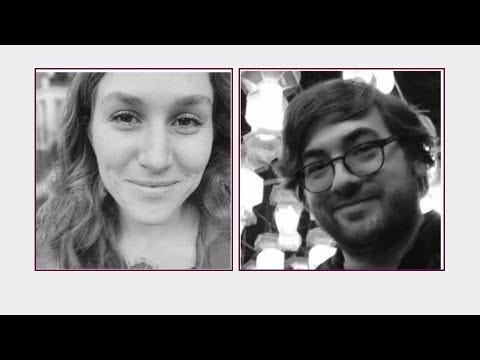"We Want Our Issues to Be Slaps in the Face." A Chat with Charles Fleming & Anna Winham, Editors of Passengers Journal
Editors of online lit mag take us behind the scenes
TGIM, friends! …Oh come on, don’t tell me that celebrating Mondays is not a thing.
Anyway, we have cause to celebrate here as another interview has just wrapped, and it was such a delightful one.
Today I chatted with Charles Fleming and Anna Winham, Editors of Passengers Journal. This “is an online literary and visual arts publication that seeks artists whose work challenges and perhaps offends prevailing artistic or societal sentiment.”
Charles joined us from his car, a fact which speaks to his dedication to his literary magazine. And Anna has the most soothing, melodic voice that I felt I could listen to her talk all day long. Both of them were thoughtful, engaged, and had great things to say about the type of work they’re drawn to and what it means when writers and editors talk about “risk.”
But first. Did you know that this magazine is also an audio journal? That they have professional actors read every piece that gets published?
I knew not! This was so interesting to me, not least of all because it’s such a great idea, and so few lit mags do this. (I can only think of one other, in fact, and it’s about to close.)
Charles told me about the process of getting works into audio. All the voice actors are presented with the material, then they decide which piece they are most excited about. Since some of the works are experimental in form, the actors have to find innovative ways to read the work out loud. With an erasure poem, for instance, Charles said he did the recording, and read the poem first, then read it again with the words omitted in order to capture the essence of erasure.
As for the substance of the writing, well, what are they looking for? What does it mean when they seek work that “challenges and perhaps offends?”
Charles and Anna described being partial to work that resists authority and oppression and which might not be widely accepted by more conservative literary institutions. Anna related that the first issue featured numerous pieces related to war. This subject can be taboo in the literary world, she said, as it’s politically complicated and emotionally and psychologically messy. At Passengers, they welcome that kind of work.
What, I also wondered, does it mean when editors talk about “risk”? This is a word that gets used a lot in the writing world. So what does it mean for them? Do they want to see stylistic risk, with a writer going in a direction that risks alienating the reader? Do they want to see emotional risk, where the writer bleeds on the page, so to speak?
Among the many great answers they provided, Anna mentioned “high stakes” and work that is “consequential.” Not high-stakes like Gone Girl (though we both agreed that was a fun read), but high stakes in that it matters in the world. The work will change something or someone for having read it.
Charles also talked about vulnerability and the importance of humanness in the works. Both editors cited J Brooke’s “Denny and Me” as an example of a piece that was an absolute Yes from the start. The piece captured that vulnerability, while also having an element of levity. What the editors seek in all the works is a feeling of being “shaken,” “slapped in the face,” witness to something “harrowing,” and to “move people.” But above all, the element of humanness must be present.
There is, of course, so much more here in this conversation. You’ll have to watch the video for the rest!
Passengers is open for submissions now. Response time is generally under 30 days(!). They are interested in seeing more international writers. Also, if you get a rejection, they encourage writers to keep submitting.
Volunteer readers are welcome. They are also always seeking voice actors. To get involved, fill out this form.
To everyone who came out to join the conversation today, thank you! Your faces, as you surely know by now, are the wind in my wings!
And of course, thank you to Charles and Anna for taking us behind the scenes of another nifty little magazine.
Happy viewing!
P.S. I’ve just updated the full events schedule for December. It’s here:





I have listened to three of the Lit Mag Reading Club interviews (Cleaver, Harvard Review, and Passengers Journal). These conversations are extremely valuable to writers for giving a sense of what the editors of journals are looking for. I know that's an obvious comment, but to hear the editors actually describe what excites them about the pieces they accept is much more telling than the brief mission statements journals include on their websites. I know we have to read the work itself published in these journals to understand their aesthetic and goals, but the conversations with editors give rich insight into why pieces are accepted or rejected. (And Becky is a great interviewer -- she really gets them talking.)